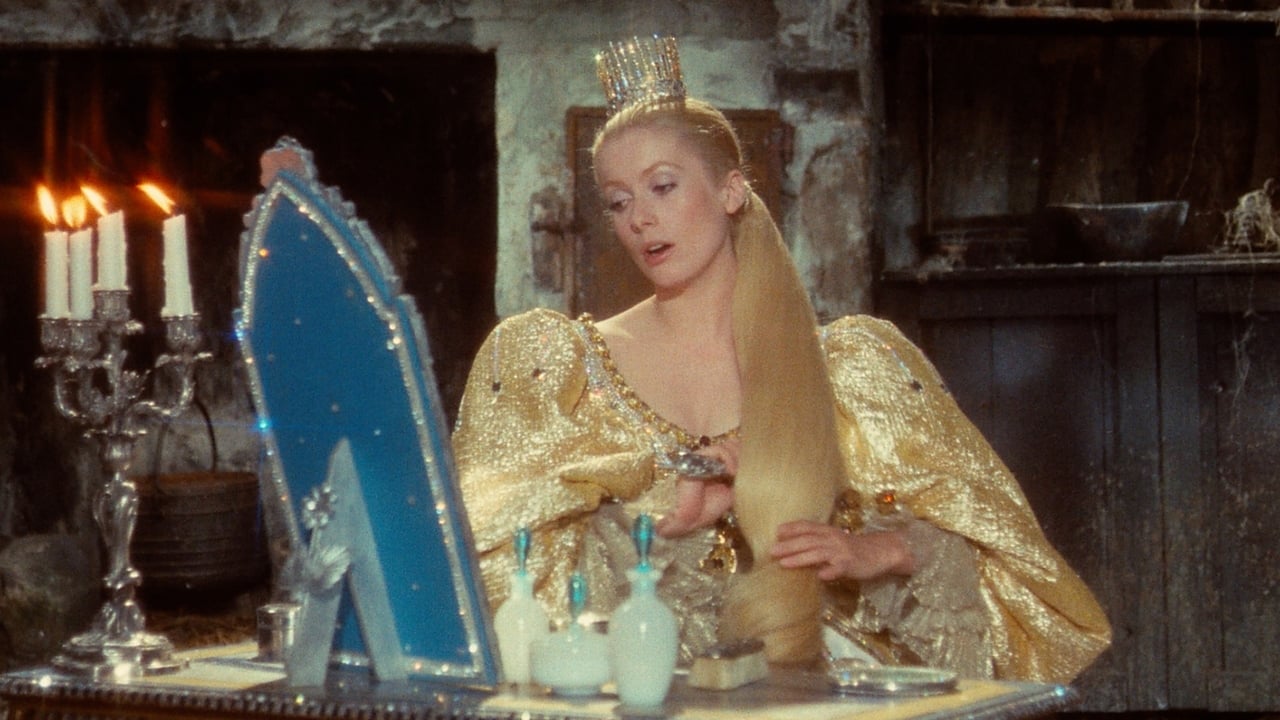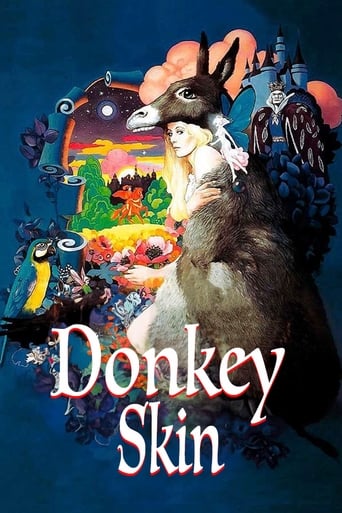

the leading man is my tpye
... View Morethe audience applauded
... View MoreOk... Let's be honest. It cannot be the best movie but is quite enjoyable. The movie has the potential to develop a great plot for future movies
... View MoreThrough painfully honest and emotional moments, the movie becomes irresistibly relatable
... View MoreRidiculous, sub-Cocteau French fairy tale with songs has Catherine Deneuve playing a runaway princess. Her father, the widower King, has made a deathbed promise to the dying Queen that he will only remarry should he find a woman lovelier than she. After rejecting all the single ladies in the land, the only lass able to meet his demand for a beautiful wife is his own daughter (the King asks the local soothsayer, "Is this a sinful love?", to which the soothsayer says, "If I had a daughter, I'd marry her."). Director Jacques Demy, who also adapted the children's story by Charles Perrault, was possibly filled with whimsy (or perhaps was suffering from a bout with childlike prankishness). His work is heavy-handed with a tale already steeped in the grotesque. Delphine Seyrig as the Lilac Fairy gives her early scenes a bit of real color (as opposed to the artificial sparkle hanging over the rest of the film), but Deneuve is wasted. She's a beauty, but the movie is beastly. *1/2 from ****
... View MoreA fairy godmother (Delphine Seyrig) helps a princess (Catherine Deneuve) disguise herself so she will not have to marry a man (Jean Marais) she does not love.Jacques Demy loved fairy tales since childhood, and they remained a strong presence in his life. He attempted to make a Sleeping Beauty film in the 1950s, and ended up putting fairy tale references in both "Lola" (1961) and "The Umbrellas of Cherbourg" (1964). With "Donkey Skin", he finally succeeded, and made what could be his greatest film.He also cast Catherine Deneuve, possibly Europe's greatest actress, and his constant muse. Rounding out the talent was Italian costume designer Gitt Magrini, who is apparently not a well-known figure, but based solely on this film ought to be.Numerous elements in the film refer to Jean Cocteau's 1946 fairy tale film "Beauty and the Beast": the casting of Jean Marais (who had been Cocteau's beast), the use of live actors to portray human statues in the castles, and the use of simple special effects such as slow motion and reverse motion.There is also the influence of Walt Disney. Demy himself noted in 1971, "When I wrote the scene where we see Donkey Skin kneading the dough and singing the song of the love cake, I saw Snow White, assisted by birds, preparing a pie." What are we to make of the incest theme? Interestingly, the whole concept seems to be ignored, with the idea of father-daughter love being wrong only on practical, never moral, grounds. What is the film trying to say? Demy returned to this theme in "Three Seats for the 26th" (1988), although in a very different context.There is also the unusual blend of fairy tale and modernity, both in the "poetry of the future" and a later reveal concerning transportation. Again, how are we to interpret this? Is it all a dream, a fantasy world outside of time itself?
... View MoreThis is a lovely film of a fairy tale, a french tale that is one of the Cinderella derivations. This one has some dark elements which seem sensible to children, but disturbing to adults, which makes this perfect for film, because it plays on two levels. The production here is aimed squarely at children, and succeeds. The DVD extras tell us that Denueve is still recognized by children as the Princess, and it seems that it remains a favorite experience with most people involved in the making.Adults who have seen Cocteau's BEAUTY AND THE BEAST will recognize many moments of film reference to that story, including the Beast there playing a beastly royal father here. The most magical moment for me in this film is a direct reference to Belle's slow motion run down the stairs. It would have been nicer to see some of these marvelous ideas (the Giant Cat as a throne, the bedspread of grass and flowers) done with a higher budget, and with today's special effects, but children fill in the gaps when they see it, and the cooking scene has a lovely little surprise in the eggs which is charming. The costumes are over the top in the best way, with a special "sky" gown. The castle sets feel a bit cavernous and empty, like, well, sets.Catherine Denueve plays two roles, briefly appearing as her own (re-haired) Mother, and the enchanted Princess. Deneuve was actually a bit old to play a princess, but still exquisitely lovely, and the good fortune here is that by this time in her career her acting has more depth and this benefits her role. She seems to grow up and become more womanly before us. Not a sentimental tale, the ending has some modern surprises which remind us of the timeless nature of the Lilac Fairy, parent child relationships, and unsettling dynamics of relationships. Michel Legrand's dissonant melodies flesh out this feeling. This is lost on the children, of course. So this film is light and pretty, with something for everyone.
... View MoreHAIKU: Once upon a time / In France, girls wore donkey skins / To not marry dadFOUR PLUSES & A NEGATIVE: 1) French fairy-tale by Charles Perrault, the 17th-century author of "Cinderella" and "Sleeping Beauty." 2) Musical with easy-on-the-ears songs and melodies. 3) By the same French director who brought to screen "Les Parapluies de Cherbourg (The Umbrellas of Cherbourg)" and "Les Demoiselles de Rochefort (The Young Girls of Rochefort)" among other classics of French cinema. 4) Catherine Deneuve at her most radiant! 5) Themes involving scatology, incest, and bestiality. RANDOM THOUGHTS: I saw this film in my sixth grade French class. We went to see it at the Film Form (I think it was there, at least maybe it was at the Alliance Française) and then we went to a French restaurant where my arch enemy at that time, Richard Salz, had an embarrassing moment with his French Onion Soup. Being the poor Black kid at a rich White private school, I didn't have money for an appetizer, so I watched while everyone else ate their soup or snails. Still, I remember having felt transported to another place and time, a feeling that would be recreated later in life by drugs and alcohol. I would recommend this film to anyone who enjoys French cinema or to brave families who like fairy tale films. Despite the "strange" themes, it is told responsibly, almost as if it where a life lesson that everyone had to learn at some point in their lives, like all dads want to marry their daughters and daughters would oblige were it not for this film If you'd like to read more of my haiku, please visit my blog at: richardwallenhaiku.blogspot.com
... View More